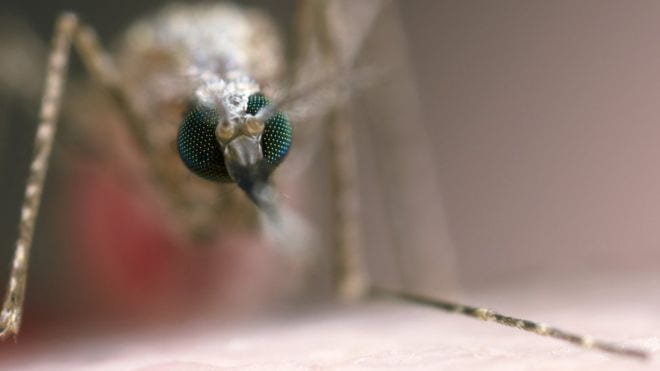Milestones made toward developing malaria vaccine

A new malaria vaccine that is currently under development has recently passed major clinical trial milestones. Malaria is a serious and potentially fatal disease transmitted by mosquitoes primarily in subtropical and tropical regions. According to the CDC, in 2015 approximately 214 million cases of malaria occurred around the world and 438,000 people died (mostly children in the African region). Initially the disease presents with influenza-like symptoms, but can progress rapidly to include disorientation, seizures, kidney failure, respiratory distress, coma, and death.
In the United States, although malaria was eliminated from mosquitoes in the 1950s, around 1,500 cases are still diagnosed every year in individuals who have recently travelled to malaria endemic areas. There is occasionally a local outbreak of malaria when a local mosquito bites one of these foreign-infected individual and then transmits the disease to local residents, and there have also been several reported cases of transfusion-transmitted malaria.
For travelers who are visiting areas where malaria is endemic, there are several different prophylactic medications that they can take, most of which must be taken for a certain amount of time before the trip to a certain amount of time after the trip. These medications in combination with good mosquito prevention practices are an effective way to prevent malaria infections in travelers. However, for people who live in malaria endemic areas and often don’t have access to comprehensive healthcare resources, the options are much more limited. It is not practical to stay on malaria prophylaxis for life, and treatment, which consists of anti-malarial drugs in addition to advanced supportive care as needed based on the severity of the disease, can be expensive and difficult to implement on a large scale.

Clearly, a malaria vaccine would make a dramatic impact in the areas where the disease is so debilitating. There is currently no commercially available vaccine. Until recently, the best candidate for a malaria vaccine is called RTS,S, which has completed Phase 3 trials. This vaccine is geared towards children, who are considered to be the most at-risk age group, and the Phase 3 trials showed that the vaccine helped to protect children and infants from clinical malaria for at least three years after the first vaccination. The vaccine is currently in Phase 4, which is aimed at detecting rare adverse effects as well as long-term efficacy, and pilot implementation studies recommended by the World Health Organization are currently underway.
However, RTS,S has an efficacy of only 31.5% against severe malaria, and recent research has now suggested a different type of vaccine that may be more effective. RTS,S is made of components of the organism that causes malaria, whereas the new technology genetically modifies the organism so that it is incapable of causing disease but stimulates an immune response – it is thought that using the whole organism will result in a higher efficacy against malaria. The milestones in testing that were reported last week are that this genetically modified organism was transmitted to humans (via mosquito bites) and then the antibodies the humans had developed were transferred to mice who were challenged with malaria and found to be resistant. Although these are promising milestones, there are still many steps that need to be taken before this new technology can result in a vaccine that is ready for clinical testing. It will need to be formulated into a single injection (versus being transmitted via 150-200 mosquito bites per person, as it was in the recently published study) and approved for more extensive clinical trials (the current human testing included only 10 healthy adults).
This article was written by Nikhita Parandekar De Bernardis, DVM (CVM Class of 2015), International Programs and Special Projects Coordinator at the College of Veterinary Medicine.
